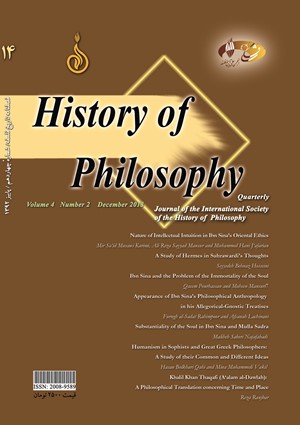-
-
List of Articles
-
Open Access Article
1 - Editor's Notes
Hossein Kalbasi Ashtari -
Open Access Article
2 - Nature of Intellectual Intuition in Ibn Sina’s Oriental Ethics
Mir Sa‘id Musawi Karimi Ali Reza Sayyad Mansur Muhammed Hani J‘afarian -
Open Access Article
3 - A Study of Hermes in Suhrawardi’s Thoughts
Seyyedeh Behnaz Hosseini -
Open Access Article
4 - Ibn Sina and the Problem of the Immortality of the Soul
Ghasem Purhassan -
Open Access Article
5 - Appearance of Ibn Sina’s Philosophical Anthropology in his Allegorical-Gnostic Treatises
Furugh al-Sadat Rahimpoor Afsanah Lachinani -
Open Access Article
6 - Substantiality of the Soul in Ibn Sina and Mulla Sadra
Maliheh Saberi Najafabadi -
Open Access Article
7 - Humanism in Sophists and Great Greek Philosophers:A Study of their Common and Different Ideas
Hasan Bolkhari Qahi Mina Muhammedi Vakil -
Open Access Article
8 - Khalil Khan Thaqafi (A‘alam al-Dawlah): A Philosophical Translation concerning Time and Place
Reza Ranjbar
-
The rights to this website are owned by the Raimag Press Management System.
Copyright © 2017-2026







